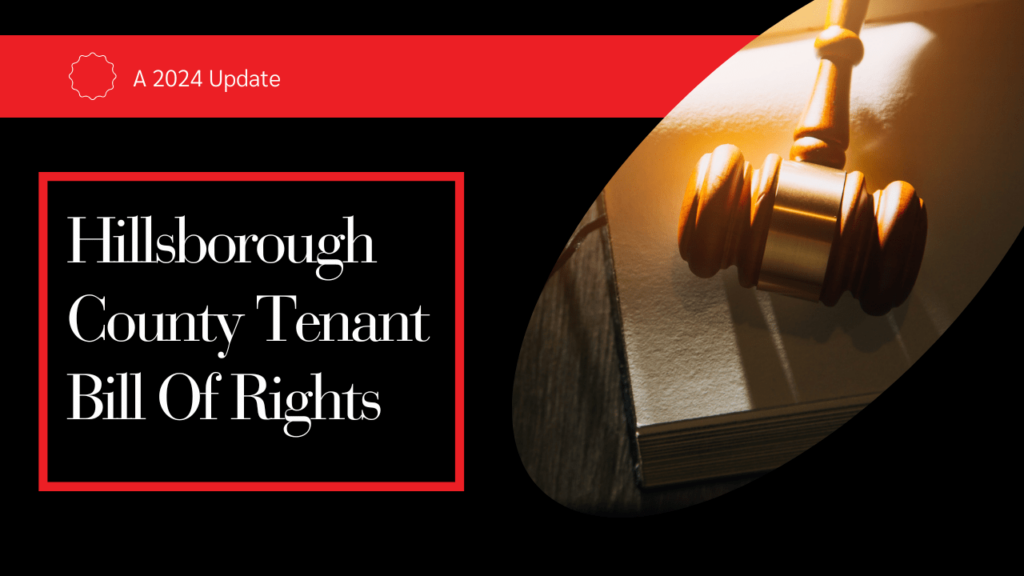
The Tenant Bill of Rights Ordinance was enacted to provide protections for residential tenants living in properties throughout Hillsborough County, Pinellas County, and the cities of Tampa and St. Petersburg. This was enforced from 2020 through 2022. The law was enacted to ensure there wasn’t any income discrimination when tenants applied to rent a home, and many experts believed that this law resulted in more affordable and accessible housing opportunities throughout the Tampa Bay area. The goal, according to the Hillsborough County Board of Commissioners, was to avoid any additional homelessness.
Things have changed a bit since the summer, and we want to make sure you’re up to date on the law and the way the State of Florida is approaching tenant protections and landlord/tenant relations. It’s important to know the law, so you can follow the rules and stay out of trouble.
Previous Tenant Bill of Rights
The law that was in effect for the last few years required a few changes for landlords and rental property owners. While we know that the protections put into place were well-intended, there was several complications that quickly popped up for many of the people we worked with.
Generally, the following requirements were introduced to protect tenants:
- Landlords and property managers were required to provide a disclosure to tenants at the time of application. This simply provided information on what kind of rights the tenant had, and where they could take a complaint if they felt those rights had been violated. We were required to provide this disclosure in both English and Spanish, and it had to be given to the tenants, in writing, before they applied for a property.
- Landlords and property managers were required to increase the amount of notice that was given before ending a tenancy.
- There was a requirement that the tenants be notified of late rent before a late fee was assessed. We could not charge the late fee without providing the notice as well as a justification for that late fee.
The most impactful part of this Tenant Bill of Rights, for most rental property owners, was that we could not deny a tenant based on source of income. Typically, this meant that if an otherwise qualified tenant applied for your property and used their housing benefits or assistance (Such as Section 8) as a source of income, they could not be refused.
These ordinances caused a lot of confusion.
For one thing, they conflicted with the Florida Landlord-Tenant Act, a state law. There was also a lack of consistency, and the ordinances that were slightly and subtly different in each county or city created five different versions of landlord/tenant laws in the Tampa Bay area.
These laws also increased the amount of work and expense that property managers and independent landlords had to incur. Our rental application alone went from a simple three-page document to 27 pages of application questions, disclosures, and information.
Landlords were required to deliver late rent notices that were area-specific to their renters before they charged a late fee, which was once automatic. There’s also a notice required under State landlord/tenant laws, and it became quite cumbersome to keep up with the administrative logistics.
Then, there’s the “source of income” requirement. Counties and municipalities did not do a great job of sharing information with local landlords on what exactly this meant and how it was to be implemented and enforced. It changed the screening process, but there were no clear understandings around what could be considered and what could not when it came to evaluating an applicant’s income.
A lot of small, private landlords who were renting out one or two homes had no idea that if they did not want to accept housing assistance payments when choosing tenants, they could now be found guilty of violating the human rights of their applicants.
Repealing the Tenant Bill of Rights and Introducing HB 1417: Residential Tenancies
On June 29, 2023, Florida Governor and Ron DeSantis signed into law HB 1417, or Residential Tenancies. This new law supersedes any local government regulations on matters covered under the Florida Landlord-Tenant Act. It keeps the matter of residential tenancies under state control rather than up for interpretation by local cities and counties.
The new law went into effect immediately, on July 1, 2023, and that means that it’s the law today. Shortly after it was passed, all of the local Tenant Bill of Rights ordinances were repealed by the local jurisdictions.
We’re back to where we were before the local laws went into effect. There’s a single landlord-tenant law in the Tampa Bay area, which stems directly from the state law. It’s less confusing for landlords and it’s less costly, too. There are fewer burdens involved in renting homes to tenants throughout Hillsborough and Pinellas Counties.
Updates to the Florida Landlord-Tenant Act
 The recently state legislation did more than simply repeal the Tenant Bill of Rights Ordinance. It also introduced two changes to the existing Florida Landlord-Tenant Act (FS-83). Basically, the changes are around modifying the notice period for terminating tenancies. Here’s what you need to know:
The recently state legislation did more than simply repeal the Tenant Bill of Rights Ordinance. It also introduced two changes to the existing Florida Landlord-Tenant Act (FS-83). Basically, the changes are around modifying the notice period for terminating tenancies. Here’s what you need to know:
- In a month-to-month tenancy, where there is no long-term lease agreement in place or enforced, you have to provide 30 days of notice to your tenant before you change the tenancy or ask them to move out. It was previously 15 days of notice that were required.
- When you’re renting to a tenant with a lease agreement in place, that lease agreement cannot require less than 30 days of notice or more than 60 days of notice that the lease will be terminated. So, if you decide you don’t want to renew a lease agreement, you’ll have to provide at least 30 days of notice, but no more than 60 days of notice.
We think it’s a reasonable change. Most of the landlords we work with and all of the good landlords we know would never provide only 15 days’ notice before terminating a tenancy. These are welcome changes, and we believe they’re balanced to protect both landlords and residents.
If you have any questions about what these legal changes mean or you’d like some help positioning your rental property in the Tampa market, we’d be happy to work with you. We are not attorneys but we use attorneys to guide us on protecting your property. Please contact us at Hoffman Realty.
